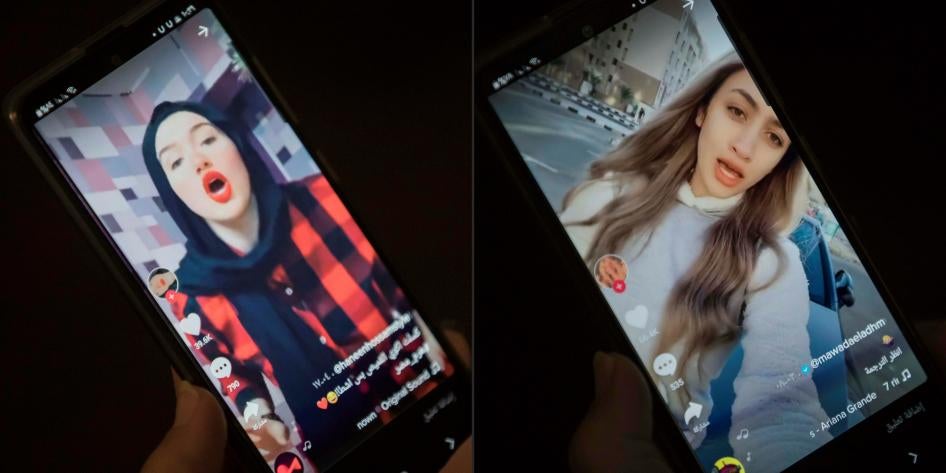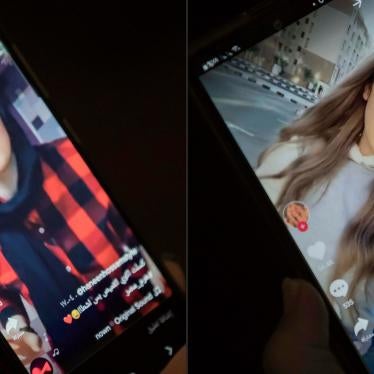“Ten years! I didn't do anything immoral to deserve all this. I was jailed for 10 months and didn't say a word after I was released... Why do you want to jail me again?”
A distraught Haneen Hossam, a 20-year-old university student and social media celebrity with almost a million followers on TikTok, expressed shock in an Instagram video on June 22 at her 10-year sentence by a criminal court. Just hours later, the police detained her.
The “morality” arrests of Hossam and other women for online conduct appears to be a populist tactic to whip up moral fervour, preying on women who already face deeply-rooted discriminatory attitudes, and making it easier for the authorities to justify and maintain stiff and arbitrary limits on freedom of expression.
In July 2020, Cairo's Economic Court, which oversees cybercrimes, initially sentenced Hossam to two years in jail and fined her 300,000 Egyptian pounds (approx. US$19,160) for “undermining family values and principles” by publishing “indecent” videos.
She was sentenced along with Mawada al-Adham, 23, who has millions of TikTok followers, and three men who helped them manage their media accounts. In January, an appeals court acquitted Hossam and the two men and upheld the fines for al-Adham and another man, but overturned their prison sentences.
However, the prosecution had also sought a more serious charge of human trafficking against them in separate criminal proceedings with what appeared to be a flimsy argument. The prosecution's main evidence seems to be a video Hossam had posted on TikTok inviting her women followers to earn money by making live videos for Likee, another video-sharing platform.
The prosecution claimed that this meant Hossam and al-Adham encouraged exploitation of their female followers, including girls, similar to apps that allow for pornography, even though the women did not make or encourage online porn videos.
On June 20, 2021, the Cairo criminal court convicted them of human trafficking in that case and sentenced Hossam to 10 years in prison and al-Adham and the three men to six years, as well as fines of 200,000 Egyptian pounds (approx. US $12,766) each, under the 2010 human trafficking law.
Under international law, as well as Egyptian law, trafficking in persons involves recruiting or transporting someone using force, deception, or abuse of power to exercise control over them for the purpose of “exploitation” such as sexual exploitation. Simply using social media apps that reward members who refer others to join should not in itself amount to such a crime, particularly where no harm has been shown.
Hossam and al-Adham are not alone. The authorities have also targeted at least 10 other female social media influencers with millions of followers on TikTok and Instagram in a campaign of arrests and prosecutions since 2020, and sentenced many to hefty fines and prison sentences of up to five years. They include Hadeer al-Hady, 23; Menatullah “Renad” Emad, 20; and a popular mother-daughter duo, Sherifa Refaat, 46, and Noura Hisham, 24.
The authorities have used a combination of broad and poorly defined laws that give prosecutors and judges huge discretion relating to charges of “public indecency” and “inciting debauchery” in the Penal Code, the 1961 law on prostitution, and online content deemed to “undermine public morals” or “family values” in the 2018 cybercrimes law.
Their claim that the women's online videos are “indecent” appears to be discriminatory and falls apart when viewing the innocuous videos that seem little different from content on Egyptian satellite TV channels and other media.
The public prosecution's aggressive campaign targeting women social media influencers stands in stark contrast to the authorities' failure to investigate and prosecute men for sexual violence against women and girls.
The wave of arrests of celebrity TikTokers and Instagrammers in 2020 coincided with a wave of #MeToo complaints in which scores of Egyptian women took to social media to speak out about their experiences with gender-based violence, assault, and rape.
A court sentenced Ahmed Bassam Zaki to eight years in prison in April for sexual assault, but only after more than 50 women and girls accused him of harassment and assault online. In other cases, the authorities failed to adequately investigate the assaults and even punished the survivors and witnesses who came forward.
Aya, 17, who is known on social media as “Menna Abdelaziz,” spoke out about her assault and gang rape on TikTok in May 2020, but found herself then detained for morality-related offences for her videos. She was released in September after much campaigning by activists, and in May a criminal court sentenced five of the people she accused.
In July 2020, women's rights activists took to social media to campaign for justice for a woman who reported that several men had drugged and gang-raped her at Cairo's Fairmont Nile City Hotel in 2014. The authorities only arrested four of the suspects after weeks of campaigning by activists, allowing other suspects to flee the country.
However, the authorities also arbitrarily arrested four witnesses, whom they had initially encouraged to come forward, and two of their acquaintances, and subjected them to abusive anal exams, drug testing, and smearing campaigns, under the guise of so-called morality and debauchery charges.
On May 11, the Public Prosecution said that there is insufficient evidence to proceed with a prosecution for gang rape and ordered the release of the four men. Yet the authorities continue to ban witnesses and their acquaintances from travel, and they might still face charges.
The Egyptian authorities' actions against women social media influencers, particularly those from lower socio-economic classes, highlight a pattern of policing women's bodies and subjecting their behaviour to moral grandstanding, while allowing impunity to reign when it comes to serious crimes of sexual violence by men from powerful backgrounds.
But Egyptian women, whether social media influencers or survivors saying #MeToo, will not be silenced.
They should be allowed to express their independence on social media videos or speak their truth. The international community should support their call for freedom - on the streets and online - from government interference and from violence and harassment.









